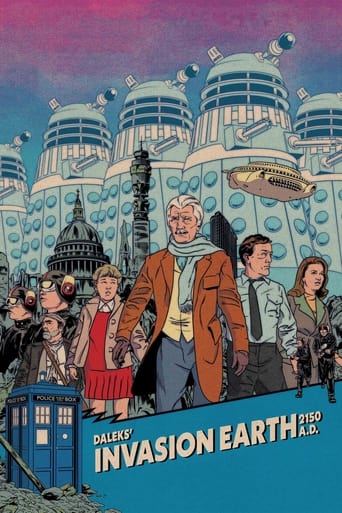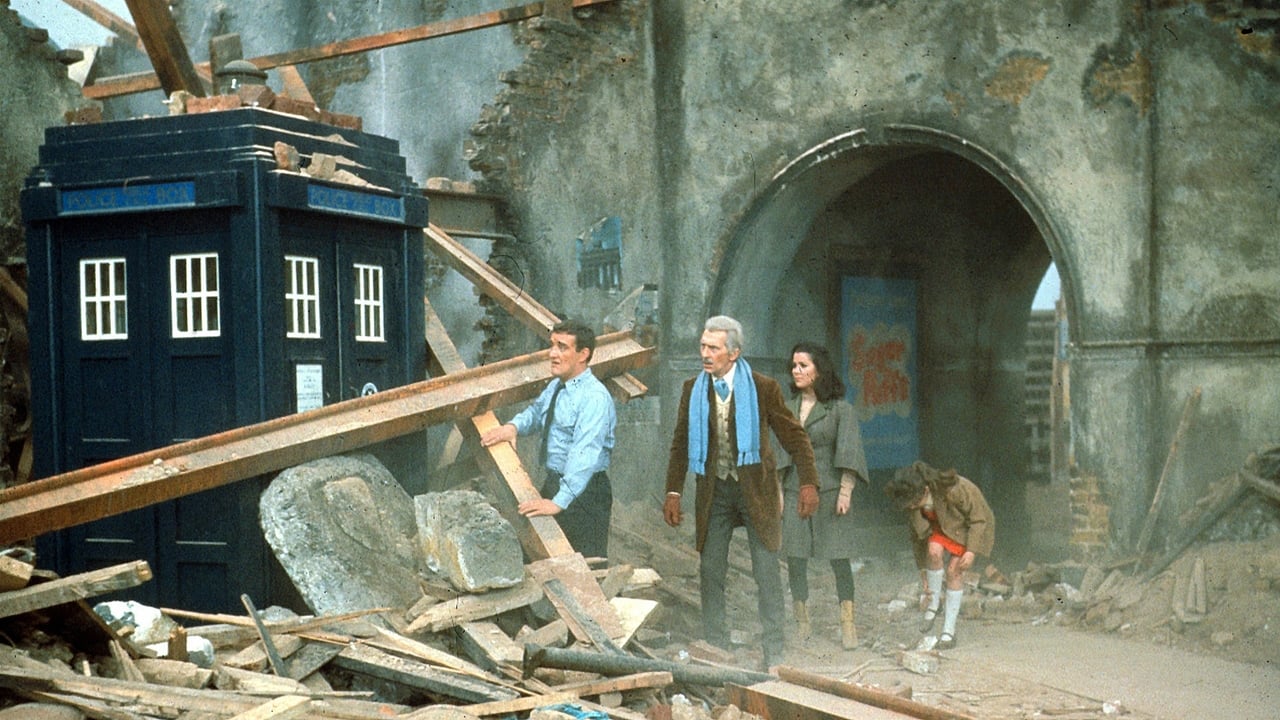Spikeopath
Daleks-Invasion Earth: 2150 A.D. is directed by Gordon Flemyng and Milton Subotsky co-adapts the screenplay with Terry Nation and David Whitaker. It stars Peter Cushing, Bernard Cribbins, Ray Brooks, Andrew Keir, Jill Curzon and Roberta Tovey. A Technicolor/Techniscope production, with music by Barry Gray and Bill McGuffie and cinematography by John Wilcox.A sequel to Dr. Who and the Daleks (1965), plot finds Cushing once again playing the Doctor, who after getting transported to 2150 A.D. finds London ravaged by the Daleks. The Daleks are turning humans into slave Robomen, but an underground human resistance offers hope. Can the Doctor and his companions aid the resistance and save Earth from Dalek damnation? Even though Dr. Who and the Daleks irked the Dr. Who fan base, understandably so since Amicus' version of the good Doctor is some way from the TV series version, it was enough of a success to warrant this sequel. You pretty much get a retread of the first film with the characterisations, Cushing's Doctor is a lovable old eccentric prof, two of his lady female relations are along for the ride (Tovey returning as the same character) and Cribbins has replaced Roy Castle as the light relief companion accidentally thrust into a chaotic world. The Daleks remain a unique and devilish foe, their voices unnerving and their colours vibrant in Technicolor.Plot follows a familiar trajectory, much running, puffing, capture and escape histrionics, the good versus evil core booming throughout. The sets remain cheap, the effects basic but quaint, and the acting just about passes the test because everyone seems to be enjoying themselves and therefore performing it to the required standard. The music score is truly out of sync with the picture, at times it sounds like it belongs in a Carry On movie, at others an episode of The Avengers; in fact John Steed would have been a good addition to the plotting! But there is some darkness in the story, making it more potent than its prequel.This wasn't as successful as the studio hoped, so a third film was shelved. If you aren't a hardcore Dr. Who fan and you can accept it on its own daft and fun terms? Then Daleks-Invasion Earth: 2150 A.D. is an enjoyable enough time filler. 6/10
James Hitchcock
Hartnell, Troughton, Pertwee, Baker T, Davison, Baker C, McCoy, McGann, Eccleston, Tennant, Smith.To the "Doctor Who" fan these names trip off the tongue as easily as do the Kings and Queens of England to the historian or the current England batting line-up to the cricket lover. Yet there is one name missing from the Timelords Cricket Club First Eleven: Peter Cushing, who doesn't even make it onto the scorecard as twelfth man. Although Cushing played the Doctor in two films from the mid-sixties, of which this is the second, he is generally omitted from the "official" sequence; the current incumbent, Matt Smith, is regarded as the Eleventh Doctor, not the Twelfth.Although William Hartnell was the British television Doctor at the time, for some reason he was not asked to play the role in the films, even though both were based upon television episodes which he had appeared in. The films make no mention of the Doctor being a member of the alien Timelord race; he is presumed to be a human scientist and inventor, and this deviation from one of the key premises of the television series is doubtless the reason for Cushing's banishment from the official canon. Something else missing from the film is the television version's very distinctive electronic theme tune.Yet in many ways the films remain faithful to the original concept. As in the original the Doctor has the ability to travel through space and time in his Tardis, a time machine which from the outside appears to be a police box. (In the sixties police boxes were a common sight on the streets of British cities; since 1969 they have largely been phased out, but the Tardis has always retained its original design). As in the original the Doctor is accompanied on his travels by female companions, in this case his niece Louise and his granddaughter Susan. (Susan also appeared in the early Hartnell episodes, although there she was played by Carole Anne Ford as a young woman in her early twenties; here she is played by Roberta Tovey as a young girl). Both films feature the Doctor's most iconic enemies, the Daleks.In some ways, in fact, the films look forward to the future of the franchise. In 1965 when the first film, "Dr. Who and the Daleks", came out, only one actor had played the Doctor on television. Cushing's interpretation of the role is quite different to Hartnell's. Both Doctors are elderly, but whereas Hartnell's was impatient and testy, Cushing's is eccentric but kindly, a well-spoken English gentleman. Cushing may have influenced the development of the television series; after Hartnell was replaced by Patrick Troughton it became a feature of the franchise that whenever the Doctor "regenerated" himself his new incarnation was quite different, in both looks and personality, to the previous one. In his personality Cushing seems to prefigure Jon Pertwee's Third Doctor and in his dress Peter Davison's Fifth Doctor.The title, "Daleks' Invasion Earth: 2150 A.D.", effectively summarises the plot. The Doctor, Louise and Susan, accompanied by a London policeman named Tom Campbell, travel forward in time to the year 2150. They find that the Daleks have invaded Earth and imposed their rule on the human population. London has been reduced to ruins and its surviving inhabitants forced underground, where resistance to Dalek rule is forming. The story tells how the Doctor assists these movements to liberate the planet from the Daleks. Although the story ostensibly takes place nearly two hundred years into the future, the recently-ruined city bears a much closer resemblance to the London of 1966 than to anything futuristic. Perhaps the film should have been titled "Daleks' Invasion Earth: 1967 A.D." We even see an advertisement for Sugar Puffs, a popular breakfast cereal of the time; this was, apparently, a piece of product placement as the manufacturers were sponsoring the film. They obviously liked the idea that their products would still be popular in the mid-22nd century.Objectively speaking, this is not a very good film. The acting is generally undistinguished, although Peter Cushing's interpretation of the Doctor is as good as any, and in my view better than Hartnell's. The attempts at comic relief, mostly involving Bernard Cribbins's Tom, are never really successful. Like a number of science-fiction films, the "science" involved is pure fiction; the Daleks' master-plan, apparently, is to remove the Earth's core and replace it with a giant motor, thus turning the planet into a gigantic spaceship which the Daleks will use to return to their home planet. (It's easy when you know how). There are some curious permutations of geography; Bedfordshire, one of England's least spectacular counties, has suddenly acquired mountains far more spectacular than the Dunstable Downs, and Wren's famous spire of St-Dunstan-in-the-East seems to have relocated itself from the north bank of the Thames to the South. And the film suffers from that frequent curse of sixties sci-fi; cheap, dodgy-looking special effects. It was not a success at the box office and a planned third Doctor Who film was cancelled.Yet like most Britons of my generation who grew up in the sixties and seventies I am quite unable to be objective about "Doctor Who". This film has not dated well, but I doubt if many of the television adventures of the Doctor, which we spent so many hours eagerly discussing in our school playgrounds, would stand up well in the cold light of day of 2011. For the pleasures of nostalgia, if for no other reason, even a "non-canonical" Doctor Who adventure is still worth watching. 5/10
JoeB131
This was an attempt to cash in on the popularity of the Doctor Who television show by making it into a big screen movie. Instead of using William Hartnell, who had played the role on TV, they used venerable Hammer actor Peter Cushing.The notion is that the TARDIS visits 2150 London (which looks amazing like 1965 London after it's been bombed to rubble) and finds that the Daleks have taken over the planet despite having been apparently destroyed in the first film. Daleks are like cockroaches, you can never seem to permanently kill them off. Anyway, lot of meandering scenes, largely because they modified the meandering six part serial this was based on without bothering to tighten up the script.Cushing seems disinterested in the first half of the movie, only really coming through in the second half.A curious film, maybe of interest to hard-core Doctor Who fans.
screenman
I would desperately like to say something good about this movie. But I can't.I can remember the arrival of the Daleks on BBC's - then - new television series 'Dr Who', starring the ever-reliable William Hartnell. They were, for the time, convincingly unpleasant - a race of interplanetary fascists. In the series, we (kids) were intended to take the show and them seriously. And for the most part, we did.By the time this dross was cobbled together, Daleks as frighteners were already passe. Someone had realised that they could be defeated by something as simple as a flight of stairs. Their credibility was blown.So here in 'Invasion Earth' we have the original premise of these aliens as ruthless monsters bent on conquest, but now played for laughs as much as drama. The two strands are twined together with unbelievable clumsiness.Hartnell is replaced by even more solid Peter Cushing. And although typically a straight actor; now he's expected to ham it up with a bit of slapstick comedy. It's something he cannot and does not do. His predicament is worsened by the utter wretchedness of the gags. For his sidekick we have the likable Bernard Cribbins. He has usually been cast as a comic of sorts, but here again his material is of such sphincter-puckering banality that you wonder what the script-writer and director were thinking.Onr or two other C-movie faces catch the eye, otherwise they are about as memorable as their script lines.The Dalek spaceship doubles as the earthbase, which is convenient and saves money. And its interior is the usual flashing-lights-on-panels hokum. Although they've managed to conquer Earth, the Daleks still haven't found an answer to the 'steps' problem, and continue to glide about on ramps.I cannot imagine what the budget must have been. Apart from wages, the remainder surely couldn't exceed my present-day weekly shopping bill. There's a few junk-strewn roads (filmed on Sunday). A quarry, an very old van, some petrol bombs, and that's about it.Some movies fall into the 'so bad, they're good' category, but the utter wretchedness of this piece seems to fail even that evaluation. It's not camp enough to be a drag. The gags are not bad enough to be laughable. And it's still too serious in parts to be written-off as a failed comedy.If ever proof were needed as to why British cinema collapsed this is surely as copper-bottomed as evidence gets. It's a nightmare for all the wrong reasons.


 AD
AD








